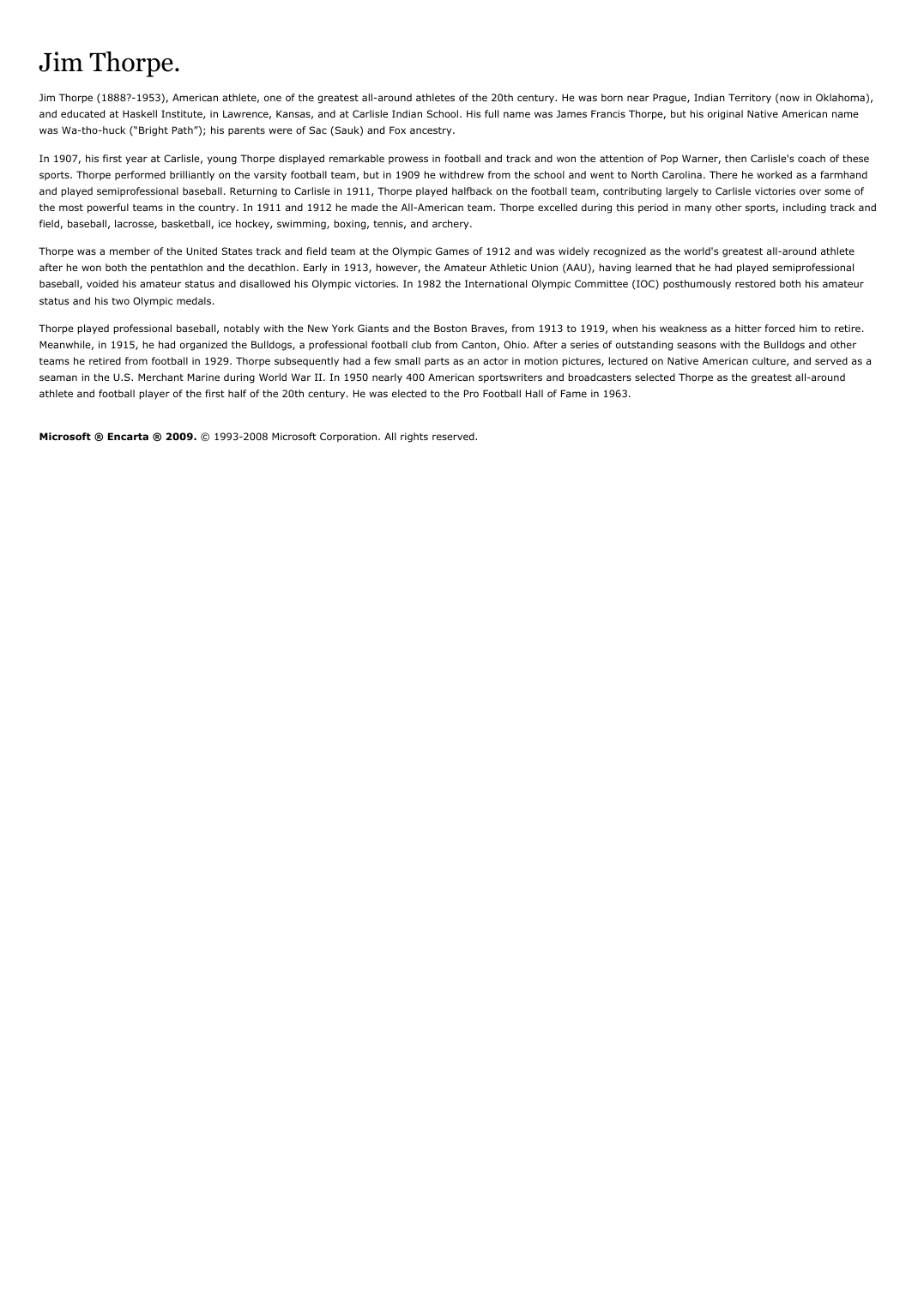Jim Thorpe.
Publié le 06/12/2021
Extrait du document
Ci-dessous un extrait traitant le sujet : Jim Thorpe.. Ce document contient 409 mots. Pour le télécharger en entier, envoyez-nous un de vos documents grâce à notre système d’échange gratuit de ressources numériques ou achetez-le pour la modique somme d’un euro symbolique. Cette aide totalement rédigée en format pdf sera utile aux lycéens ou étudiants ayant un devoir à réaliser ou une leçon à approfondir en : Echange
Jim Thorpe.
Jim Thorpe (1888?-1953), American athlete, one of the greatest all-around athletes of the 20th century. He was born near Prague, Indian Territory (now in Oklahoma),
and educated at Haskell Institute, in Lawrence, Kansas, and at Carlisle Indian School. His full name was James Francis Thorpe, but his original Native American name
was Wa-tho-huck ("Bright Path"); his parents were of Sac (Sauk) and Fox ancestry.
In 1907, his first year at Carlisle, young Thorpe displayed remarkable prowess in football and track and won the attention of Pop Warner, then Carlisle's coach of these
sports. Thorpe performed brilliantly on the varsity football team, but in 1909 he withdrew from the school and went to North Carolina. There he worked as a farmhand
and played semiprofessional baseball. Returning to Carlisle in 1911, Thorpe played halfback on the football team, contributing largely to Carlisle victories over some of
the most powerful teams in the country. In 1911 and 1912 he made the All-American team. Thorpe excelled during this period in many other sports, including track and
field, baseball, lacrosse, basketball, ice hockey, swimming, boxing, tennis, and archery.
Thorpe was a member of the United States track and field team at the Olympic Games of 1912 and was widely recognized as the world's greatest all-around athlete
after he won both the pentathlon and the decathlon. Early in 1913, however, the Amateur Athletic Union (AAU), having learned that he had played semiprofessional
baseball, voided his amateur status and disallowed his Olympic victories. In 1982 the International Olympic Committee (IOC) posthumously restored both his amateur
status and his two Olympic medals.
Thorpe played professional baseball, notably with the New York Giants and the Boston Braves, from 1913 to 1919, when his weakness as a hitter forced him to retire.
Meanwhile, in 1915, he had organized the Bulldogs, a professional football club from Canton, Ohio. After a series of outstanding seasons with the Bulldogs and other
teams he retired from football in 1929. Thorpe subsequently had a few small parts as an actor in motion pictures, lectured on Native American culture, and served as a
seaman in the U.S. Merchant Marine during World War II. In 1950 nearly 400 American sportswriters and broadcasters selected Thorpe as the greatest all-around
athlete and football player of the first half of the 20th century. He was elected to the Pro Football Hall of Fame in 1963.
Microsoft ® Encarta ® 2009. © 1993-2008 Microsoft Corporation. All rights reserved.
Jim Thorpe.
Jim Thorpe (1888?-1953), American athlete, one of the greatest all-around athletes of the 20th century. He was born near Prague, Indian Territory (now in Oklahoma),
and educated at Haskell Institute, in Lawrence, Kansas, and at Carlisle Indian School. His full name was James Francis Thorpe, but his original Native American name
was Wa-tho-huck ("Bright Path"); his parents were of Sac (Sauk) and Fox ancestry.
In 1907, his first year at Carlisle, young Thorpe displayed remarkable prowess in football and track and won the attention of Pop Warner, then Carlisle's coach of these
sports. Thorpe performed brilliantly on the varsity football team, but in 1909 he withdrew from the school and went to North Carolina. There he worked as a farmhand
and played semiprofessional baseball. Returning to Carlisle in 1911, Thorpe played halfback on the football team, contributing largely to Carlisle victories over some of
the most powerful teams in the country. In 1911 and 1912 he made the All-American team. Thorpe excelled during this period in many other sports, including track and
field, baseball, lacrosse, basketball, ice hockey, swimming, boxing, tennis, and archery.
Thorpe was a member of the United States track and field team at the Olympic Games of 1912 and was widely recognized as the world's greatest all-around athlete
after he won both the pentathlon and the decathlon. Early in 1913, however, the Amateur Athletic Union (AAU), having learned that he had played semiprofessional
baseball, voided his amateur status and disallowed his Olympic victories. In 1982 the International Olympic Committee (IOC) posthumously restored both his amateur
status and his two Olympic medals.
Thorpe played professional baseball, notably with the New York Giants and the Boston Braves, from 1913 to 1919, when his weakness as a hitter forced him to retire.
Meanwhile, in 1915, he had organized the Bulldogs, a professional football club from Canton, Ohio. After a series of outstanding seasons with the Bulldogs and other
teams he retired from football in 1929. Thorpe subsequently had a few small parts as an actor in motion pictures, lectured on Native American culture, and served as a
seaman in the U.S. Merchant Marine during World War II. In 1950 nearly 400 American sportswriters and broadcasters selected Thorpe as the greatest all-around
athlete and football player of the first half of the 20th century. He was elected to the Pro Football Hall of Fame in 1963.
Microsoft ® Encarta ® 2009. © 1993-2008 Microsoft Corporation. All rights reserved.
↓↓↓ APERÇU DU DOCUMENT ↓↓↓

































